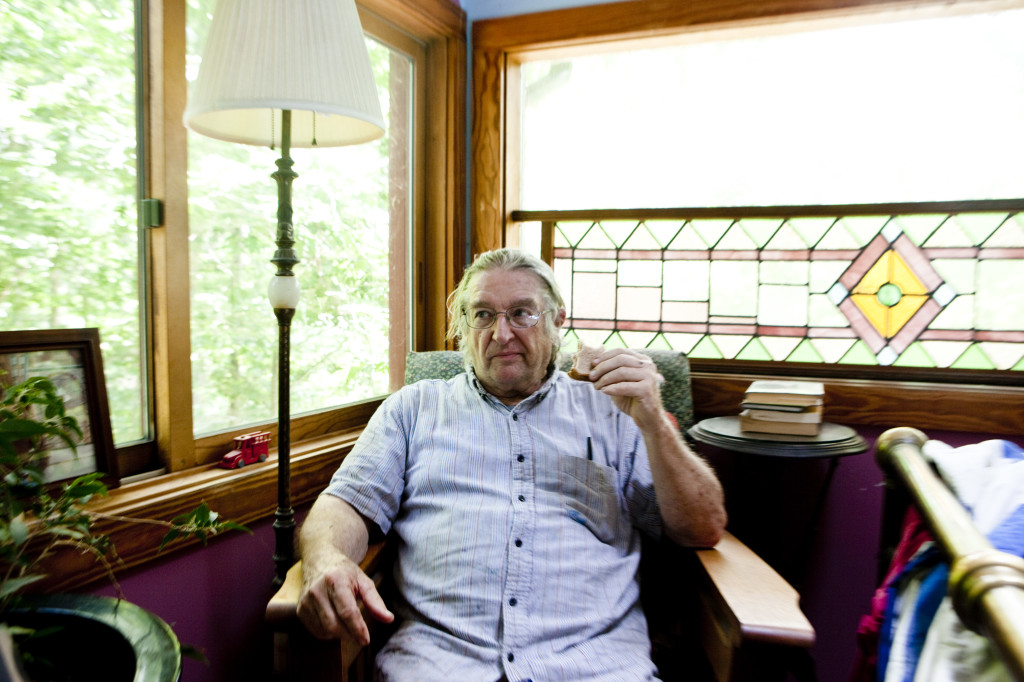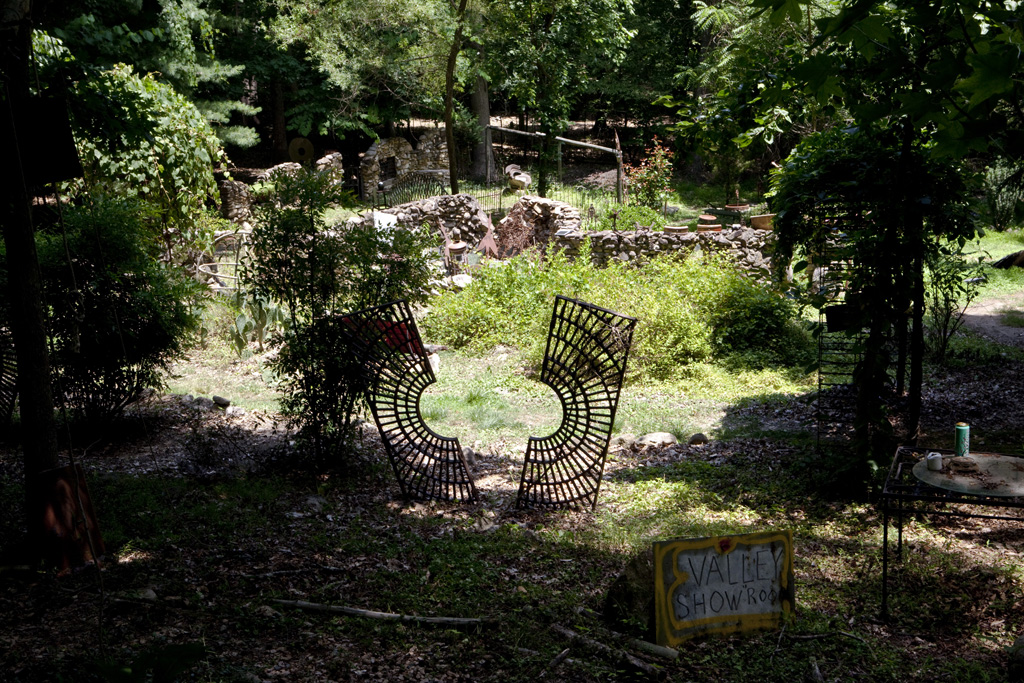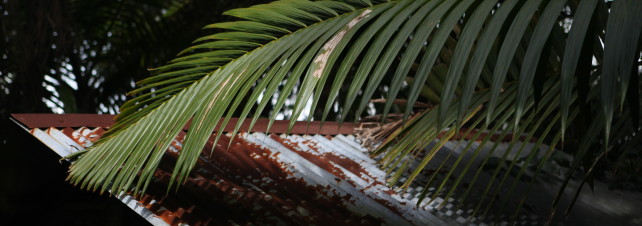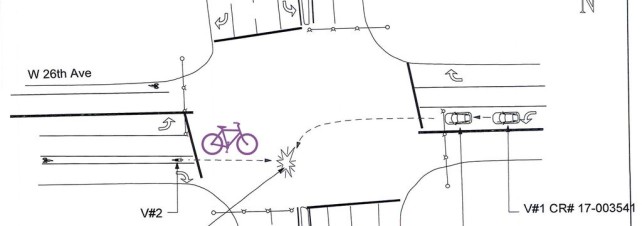This miniature documentary piece is the first product of a new model I tried out at The News & Observer. Basically, I found experienced videographers who wanted to explore journalism, and together we looked for efficient and striking ways to tell visual stories.
“The Last Unicorn,” is about a man at the end of an unusual career. Gaines Steer is one of the woodsy characters who gave Chapel Hill its reputation, even if most people have forgotten about the secret garden he built. Holt Menzies and I both shot and edited the piece. The accompanying story ran in The News & Observer.
CHAPEL HILL — To shut down his business, Gaines Steer would have to do something about the artifacts and anachronisms scattered around his 5-acre lot.
There was the healing circle, the teepee, the log cabin and the paths through his woods. He’d have to decide the fate of countless rusted gates, piles of stained glass and a golden 1977 Ford Ranchero topped by a painted unicorn.
“I had a million dollars worth of stuff in my backyard,” said Steer, 72, pausing during an impromptu tour.
The Last Unicorn, a folk-art wonderland stashed five miles south of UNC-Chapel Hill, is shutting down. Steer is one of a generation of characters who gave Chapel Hill its reputation, nurturing a Carolina back-culture in the woods around the university town.
On June 30, he begins a retirement transition like no other. He may stay for a while on the land – but his step back marks another shift of the fast-developing area once known as “Big Woods.”
“I didn’t want to be one of those folks that are in denial about either death or old age,” said Steer, who lived for a decade in intentional communities, or communes, and counts 25 jobs on his résumé.
Since Steer bought the land in 1988, The Last Unicorn has become both his canvas and a meeting place for spiritual seekers and patchwork philosophers. The artifacts that came through here have landed on the walls of artisan businesses and the dirt of chic gardens across the state.
To cap his 26-year run, Steer has been manning the outdoor store from sunup to sundown for six weeks, hoping to unload his box of iron finials, his Argentinian balcony post and the rest of his collection at a 50 percent discount.
For his friends and customers, it may be a final chance to see the place in full bloom.
“It’s a place that has a sense of wonder and beauty – natural beauty,” said Machai St. Rain, a longtime friend and customer. She came first as a landscaper, looking for his legendary decorations, and later became a friend in spirituality.
“Who else has that stuff? Where do you buy your 18th-century gate?” she asked.
Of course, she has also learned to be wary of Steer’s whims. He has announced at least a couple times that the place is going out of business, she said.
“Each time, I really wonder,” she said. “But he does seem to be more serious right now.”
A Chapel Hill character
Steer was born into “a good old Southern family” in South Carolina, 1942. He served in the National Guard, lived 10 years in communes, helped raise four kids, and survived two divorces and alcoholism.
He seems like he’s never sure where his personality will take him. He might apologize for rambling, or recite a pseudo-Native American chant he wrote himself. He calls himself a character, though he denies he means to be.
“Other places I lived, I stuck out too much,” he said. “But … Chapel Hill is notorious for characters. I fit right in.”
Much of his work, and his personality, involves other people. Though the store has been his anchor, he’s currently a paid counselor and a coach in memoir writing, having published 174 pages of his own.
“I don’t have a mind like a steel trap, but there’s something about the way that I’ve put together Gaines Steer that overrides the lack of a huge IQ,” he said. “I’m open to lots of things, and I can explain things – I can break things down.”
This unrelenting self-expression draws people to Steer. Forty friends helped him build the high wooden walls of his pagoda-style prayer building and install its yin-yang stained-glass window.
In exchange, Steer keeps the land open to people such as the schoolteachers who came by recently to crack a beer in the meditation room
“It’s very rare that you find a place that’s open, no strings attached,” he said. “I’m not buying, and I’m not selling. I’m promoting.”
The Last Unicorn also has been host to sweat-lodge sessions, group healing and zodiac traditions, while Steer himself was a founder of Unity Center of Peace, a universalist group, according to Greg Louie, one of Steer’s closest friends.
“When one is able to personalize their faith life,” Louie said, “then there is this intimate connection between one’s self and what everyone calls the higher power.”
The Last Unicorn’s last day is less than a week away, and still there’s no saying what comes next. Steer said even two weeks ago that a sale was possible, but now plans to stay on the land.
A downsizing plan
He says he’ll close for the summer, then reopen a new, smaller antiques business on about an acre of the land. He may keep the name, although he could get a good deal selling TheLastUnicorn.com.
He figures he just needs to sell some of this stuff, so that he might pay off his house and his credit-card debt.
He plans also to move into his attached apartment and rent the main house. Many of the antiques will have to go – nobody wants to live in an antique store, he says – but he plans to keep the meditation room open to the public.
Louie has been talking to Steer every day for years, and he thinks Steer will come around to something resembling a retirement community for characters.
Steer had seemed ready, during a long group conversation in the meditation pagoda, to sell his land and move to Hillsborough. That’s where Louie figures he will find world travelers and homesteaders – “independent-minded people that are also Southern,” Louie said.
Steer’s not so sure. He’ll stay for now, waiting as development creeps south from Chapel Hill, holding onto his little patch of counterculture.
“On some level, I see this as an adventure. That’s the best way to see this,” he said. “If I don’t, there’s too much fear.”
And with that change, Louie figures, comes an invitation for others to take Chapel Hill’s spirit of quirkiness – perhaps downtown instead of deep in the woods.




